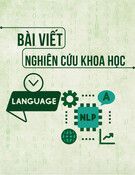
Hue University Journal of Science: Social Sciences and Humanities
ISSN 2588-1213
Vol. 133, No. 6B, 2024, p.p. 147–165, DOI: 10.26459/hueunijssh.v133i6B.7402
ROLE DEVELOPMENT IN ONLINE EFL LISTENING CLASSES:
A CASE STUDY IN HIGHER EDUCATION IN VIETNAM
Pham Hong Anh*
University of Foreign Languages and International Studies, Hue University
57 Nguyen Khoa Chiem Str, Hue, Vietnam
* Correspondence to Pham Hong Anh < phonganh@hueuni.edu.vn >
(Received: January 04, 2024; Accepted: May 02, 2024)
Abstract. The roles of the teacher and students in online language classes have been a well-researched
area, yielding various insights into the potentials of online technologies and the need for a consideration of
re-defining classroom roles. Drawing on a case study, for particularities, this paper presents the results of
an exploratory investigation into the development of classroom roles in an EFL Listening class integrating
online technologies at a university. Teacher and student interviews and Zoom class observations were
used as instruments for data collection. Findings from qualitative data analysis show two major issues.
First, there was a critical development of the teacher’s roles and her students’ roles over a semester of
listening instruction totally based on online technologies. Second, online technologies helped enable the
development of roles, which otherwise was impossible. Among the discussion issues, an argument that
can be raised concerns the relationship between teachers' and students' roles and identities. The paper
implies a need to redefine classroom roles in higher education.
Keywords. EFL Listening classes, online language classes, role development, university teacher’s roles,
university student’s roles
1. Introduction
The roles of the teacher and students in online classes have been a well-researched area
yielding various insights into the potential of online technologies and the need for a
consideration of re-defining classroom roles. It has been claimed in the literature that there has
been a shift in classroom roles primarily on the part of the teacher when online technologies are
involved (Alvarez & Espasa 2010; Bennett & Lockyer, 2004; Guasch, Lam & Lawrence, 2002;
Smith & Kolosick, 1996). The teacher, while still playing the main roles like those in traditional
classes such as planning lesson plans, disseminating knowledge, managing classes, evaluating

Pham Hong Anh Vol. 133, No. 6B, 202
4
148
students, is required to be able to deal with issues emerging from the online environment.
Those issues range from technical skills of using software to those which are far more
pedagogical with essentially an understanding of the online environment for the meaning-
making process (Salmon, 2000). Since the teacher and students do not meet face-to-face, it is
vital for the online teacher to create an environment supporting and maintaining students’
interaction and motivation (Bennett & Lockyer, 2004). This remains a potential area rich for
further research into classroom roles in online environments in various contexts.
In the context of higher education particularly, Bennett and Lockyer (2004) emphasize a
call for a movement from teacher-directed instructional practices to student-centred
approaches, claiming that university teachers have still relied on mass lectures and tutorials. To
respond to the reality and meet the necessity for a change, many universities have offered more
online courses involving less face-to-face and more distance or online interaction capitalized by
online technologies. This has presented a shift in pedagogy in concert with the implementation
of online technologies (Bennett & Lockyer, 2004). The shift has brought about critical changes
primarily to the role of the teacher and thus transformed both teaching and learning
experiences. Specifically, Wheeler (2010) suggests a new pedagogical practice required of by the
online teacher, focusing on developing students’ collaborative knowledge construction and
promoting a culture of sharing and collaboration through Web 2.0 open learning. In the same
vein, Salmon (2000) indicates characteristics that an online teacher needs to develop, concerning
not simply technical skills but more importantly online communication skills to engage
students online, content expertise to support students’ knowledge construction, and the
development of students’ personal characteristics such as adaptability, positivity, and
confidence, all of which can be obtained when/if the teacher has an understanding of the online
environment. At the macro level, the shift in pedagogy and practice has been recognized in both
literature and reality (Oliver, 2001).
While much attention has been paid to the necessity of a repertoire of (new) roles
required by the online teacher, which entails shifts in students’ roles, there has still been a call
for an elaboration of the roles (Guasch et al., 2010). As a matter of fact, detailing teacher roles
has been done from different perspectives, mostly focusing on competencies required by the
online teacher, thus yielding different recognitions of roles (Guasch et al., 2010). According to
Guasch et al. (2010), this lack of consensus on what roles are and how they can be distributed
can be explained by the fact that roles are shaped in association with particularities of the online
context. These researchers therefore claim that the diversity of outlooks on this topic highlights
the need to carry out contextualized studies for elaboration of roles. This is where this study fits
in. Specifically, this study aims to investigate a teacher’s and her students’ roles in an online
EFL Listening class over a semester at a university during COVID-19. This lends itself well to

Jos.hueuni.edu.vn
Vol. 133, No. 6B, 2024
149
the contextualization need. More importantly, the online teaching and learning reality implies
that roles are not something ready-made in the online environment but take time to develop in
accordance with the context and/or discourse. An observation of how roles develop over a
period of time, which is still of little scholarly attention, would provide insights into how roles
should be elaborated. The latter serves as the motivation for this study. With that, this study
seeks answers to the research question: How do the university teacher’s and students’ roles
develop in an online EFL Listening class over a semester?
2. Literature review
2.1 Roles of teachers and students in language classes
Role is defined as what one does and/or expected to do in a particular environment (Lam
& Lawrence, 2002; Lee & VanPatten, 1995; Wright, 1987). It is emphasized that role is not only
expressed through what one does but also what other people believe what one should do, the
social expectation to be precise (Lam & Lawrence, 2002; Walker & Shore, 2015). The expectation
could be prescriptive or norm-based, according to some theorists, and could be preferences
according to others (Walker & Shore, 2015).
In the literature (e.g.: Lam & Lawrence, 2002; Walker & Shore, 2015; Wright, 1987), role
is indicated to be composed of three main factors: i, job-related activities, ii, relationships and
communications one has with others, and iii, behaviours and attitudes. Turner (1978) explains
the relationship of the three factors in describing how a person adopts behaviours and attitudes
accompanying activities, and how social interactions facilitate this process. However, role
conceptualization has still been fraught with discrepancies resulting from different perspectives
(Walker & Shore, 2015).
Many researchers claim that role and role development are influenced by variables such
as attitudes and beliefs (Kinchin, 2004), norms and expectations (Ryu & Sandoval, 2010; Webb,
2009), experience (Eick & Reed, 2002), and social factors (Reiman & Peace, 2002). Role
development in the classroom particularly is influenced by other variables like student
engagements and levels of interaction (Herrenkohl & Guerra, 1998; Walker & Shore, 2015). An
example of role development, student engagement, and social interactions from Herrenkohl
and Guerra (1998) studying a science class shows that students who took on audience roles
were more engaged and more sharing in the knowledge construction process, which led to a
shift in the teacher role toward mediator and monitor within the classroom.

Pham Hong Anh Vol. 133, No. 6B, 202
4
150
2.2 Roles in the traditional language class
In the traditional class, or the offline class, teacher roles have been well-documented in
the literature. It is assumed that teachers have to take full responsibility for everything
happening in the classroom (Lam & Lawrence, 2002). Teachers are considered all-powerful and
all-knowing, control over the dissemination of knowledge and learning (Johnson, Delarche,
Marshall, Wurr, & Edwards, 1998). Teachers are catalysts, vehicles and judges for the learning
process (Smith & Kolosick, 1996). Teachers are both responsible for imparting knowledge and
creating and managing a condition favourable for learning to happen (Tudor, 1993).
In language teaching particularly, the centrality of the teacher has long been held as the
norm (Lam & Lawrence, 2002). Finkel & Monk (1997) claim that because the teacher is the only
person in the class who has expertise in the subject, the teacher is viewed as the group leader
responsible for motivation and enlightenment with a sense of purpose. In association with
teacher roles, students in the traditional class are passive audiences metaphorized as the vessel
into which knowledge is poured by the teacher (Lee & VanPatten, 1995; Smith & Kolosick,
1996). Students’ outcomes are dependent on how they conform to what the teacher requires and
on how much knowledge from the teacher that they can grasp. Critically, the students are mere
recipients who have to accept the knowledge transmitted by the teacher under the conditions
created by the teacher (Lam & Lawrence, 2002).
2.3 Roles in the online language class
Teacher roles in the online class have been researched and classified widely by many
researchers. Despite discrepancies, the classification shares commonalities, including main roles
of design, socialisation, cognition and affection, management, technology, and evaluation
(Alvarez, Guasch, & Espasa, 2009; Anderson, Liam, Garrison, & Archer, 2001; Badia, Garcia, &
Meneses, 2017; Coppola, Hiltz, & Rotter, 2002; Varvel, 2007).
In the particular context of computer-mediated communication (CMC), Salmon (2000)
uses the term e-moderator to describe the person who is responsible for building on and
responding to the contributions of the online discussion, which is considered the major part of
the teacher’s roles. The researcher suggests a model indicating five characteristics that the e-
moderator needs to develop:
An understanding of the online environment;
Technical skills in using the features of the software;
Online communication skills to engage learners;
Content expertise to support learners’ knowledge construction; and

Jos.hueuni.edu.vn
Vol. 133, No. 6B, 2024
151
Personal characteristics, such as adaptability, positivity, and confidence.
This model concentrates on teaching via CMC, which is distinct from other
responsibilities such as subject design, content development, and evaluation.
During the delivery of the course, Coppola, Hiltz, and Rotter (2002) identify three roles of
the online teacher: cognitive, affective, and managerial. In these three areas, activities relating to
learning, thinking, and information belong to cognitive roles, classroom atmosphere and
relationship with and/or among students relates to affective roles, and managerial to
management of the course.
In a broader view, Goodyear, Salmon, Spector, Steeples & Tickner (2001) develop a model
encompassing eight roles of the online teacher in association with key competences showing the
nature and scope of online teaching. The eight roles are: content facilitator, technologist,
designer, manager/administrator, process facilitator, adviser/counselor, assessor and researcher,
as shown in the following table:
Table 1: Roles and indicators of key competences of the online teacher (Goodyear et al., 2001)
Role Task areas
Content facilitator Facilitate the learners understanding of the content (‘In-course’
activity)
Technologist Making technology choices to improve the online environment
Designer Designing worthwhile learning task (‘Pre-course’ activity)
Manager/administrator Administration and record keeping
Process facilitator Welcoming, establishing ground rules, creating community,
managing communication, modeling social behaviour, establishing
own identity
Adviser/counselor Providing students with advice or counseling on a one to one basis
Assessor Provides grades and feedback
Researcher Creation of new knowledge relevant to content




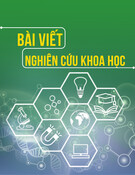
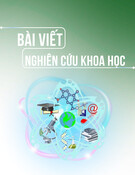

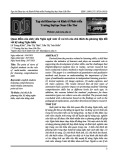
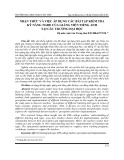
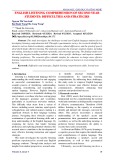



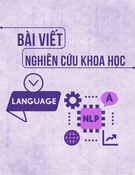
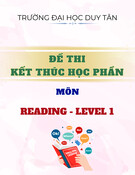
![Đề cương môn Tiếng Anh 1 [Chuẩn Nhất/Mới Nhất]](https://cdn.tailieu.vn/images/document/thumbnail/2025/20251130/cubabep141@gmail.com/135x160/51711764555685.jpg)
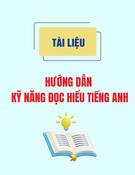


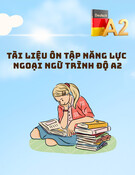
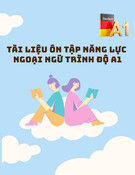
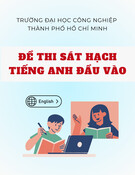

![Mẫu thư Tiếng Anh: Tài liệu [Mô tả chi tiết hơn về loại tài liệu hoặc mục đích sử dụng]](https://cdn.tailieu.vn/images/document/thumbnail/2025/20250814/vinhsannguyenphuc@gmail.com/135x160/71321755225259.jpg)
